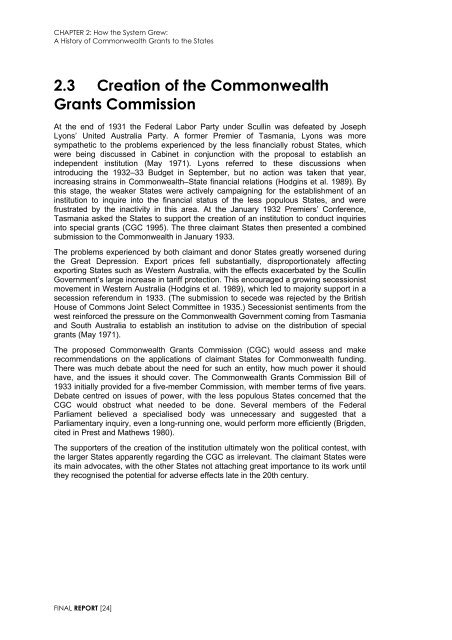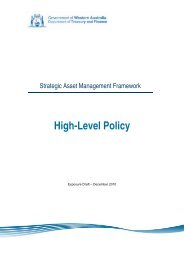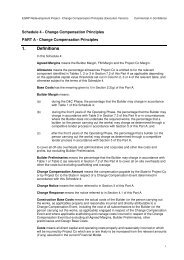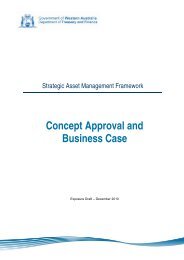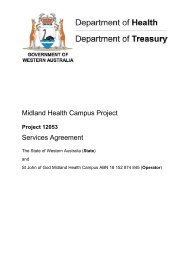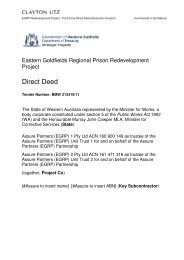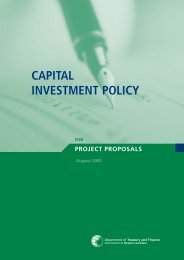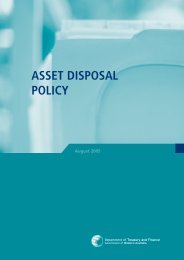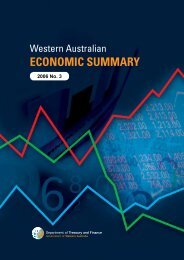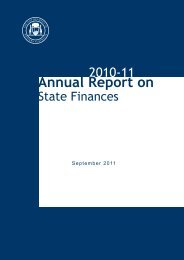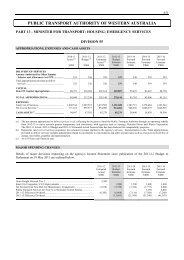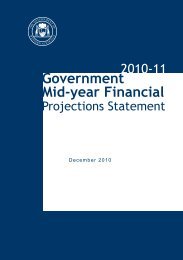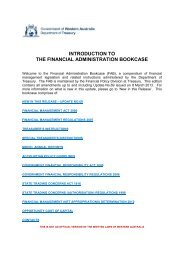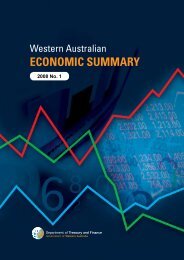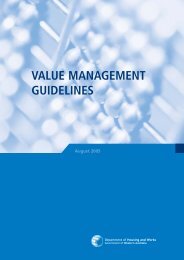Garnaut Fitzgerald Review of Commonwealth-State Funding
Garnaut Fitzgerald Review of Commonwealth-State Funding
Garnaut Fitzgerald Review of Commonwealth-State Funding
You also want an ePaper? Increase the reach of your titles
YUMPU automatically turns print PDFs into web optimized ePapers that Google loves.
CHAPTER 2: How the System Grew:<br />
A History <strong>of</strong> <strong>Commonwealth</strong> Grants to the <strong>State</strong>s<br />
2.3 Creation <strong>of</strong> the <strong>Commonwealth</strong><br />
Grants Commission<br />
At the end <strong>of</strong> 1931 the Federal Labor Party under Scullin was defeated by Joseph<br />
Lyons’ United Australia Party. A former Premier <strong>of</strong> Tasmania, Lyons was more<br />
sympathetic to the problems experienced by the less financially robust <strong>State</strong>s, which<br />
were being discussed in Cabinet in conjunction with the proposal to establish an<br />
independent institution (May 1971). Lyons referred to these discussions when<br />
introducing the 1932–33 Budget in September, but no action was taken that year,<br />
increasing strains in <strong>Commonwealth</strong>–<strong>State</strong> financial relations (Hodgins et al. 1989). By<br />
this stage, the weaker <strong>State</strong>s were actively campaigning for the establishment <strong>of</strong> an<br />
institution to inquire into the financial status <strong>of</strong> the less populous <strong>State</strong>s, and were<br />
frustrated by the inactivity in this area. At the January 1932 Premiers’ Conference,<br />
Tasmania asked the <strong>State</strong>s to support the creation <strong>of</strong> an institution to conduct inquiries<br />
into special grants (CGC 1995). The three claimant <strong>State</strong>s then presented a combined<br />
submission to the <strong>Commonwealth</strong> in January 1933.<br />
The problems experienced by both claimant and donor <strong>State</strong>s greatly worsened during<br />
the Great Depression. Export prices fell substantially, disproportionately affecting<br />
exporting <strong>State</strong>s such as Western Australia, with the effects exacerbated by the Scullin<br />
Government’s large increase in tariff protection. This encouraged a growing secessionist<br />
movement in Western Australia (Hodgins et al. 1989), which led to majority support in a<br />
secession referendum in 1933. (The submission to secede was rejected by the British<br />
House <strong>of</strong> Commons Joint Select Committee in 1935.) Secessionist sentiments from the<br />
west reinforced the pressure on the <strong>Commonwealth</strong> Government coming from Tasmania<br />
and South Australia to establish an institution to advise on the distribution <strong>of</strong> special<br />
grants (May 1971).<br />
The proposed <strong>Commonwealth</strong> Grants Commission (CGC) would assess and make<br />
recommendations on the applications <strong>of</strong> claimant <strong>State</strong>s for <strong>Commonwealth</strong> funding.<br />
There was much debate about the need for such an entity, how much power it should<br />
have, and the issues it should cover. The <strong>Commonwealth</strong> Grants Commission Bill <strong>of</strong><br />
1933 initially provided for a five-member Commission, with member terms <strong>of</strong> five years.<br />
Debate centred on issues <strong>of</strong> power, with the less populous <strong>State</strong>s concerned that the<br />
CGC would obstruct what needed to be done. Several members <strong>of</strong> the Federal<br />
Parliament believed a specialised body was unnecessary and suggested that a<br />
Parliamentary inquiry, even a long-running one, would perform more efficiently (Brigden,<br />
cited in Prest and Mathews 1980).<br />
The supporters <strong>of</strong> the creation <strong>of</strong> the institution ultimately won the political contest, with<br />
the larger <strong>State</strong>s apparently regarding the CGC as irrelevant. The claimant <strong>State</strong>s were<br />
its main advocates, with the other <strong>State</strong>s not attaching great importance to its work until<br />
they recognised the potential for adverse effects late in the 20th century.<br />
FINAL REPORT [24]


